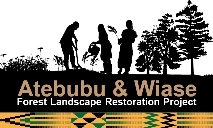Implementing since 2021
Investing €22 million of funds
To restore 15,580 ha of degraded lands
Benefiting over 4,000 people
Title: Atebubu and Wiase Forest Landscape Restoration project
Aim: “A ‘Living Lab’ for Community and Ecological Resilience”
Starting Date: June 2021
Location: Atebubu and Wiase districts in Bono region, Central Ghana
Value: €22m
Implementors: Atebubu, Wiase and Dwan communities, NGPTA, Nature and Development Foundation (NDF) and APSD
Supporters: Funded by AstraZeneca and coordinated by Circular Bioeconomy Alliance (CBA).
“In the past, organizations made empty promises. I couldn't believe it when I received my mango seedlings. The opportunity for women participation, access to training and tree seedlings is a great achievement of the project. In a few years, I will be selling my mangoes to pay my children's school fees” Monica Nkrumah, a farmer in Mframa.
"Partnering with this project as a nursery operator has been a transformative journey. Beyond being a source of employment for me and many women in the community, we are working together to create a lasting impact through high-quality tree seedlings for planting”- Gambo Bashiru – Sene West
"As a representative of the chief on the Advisory Board, entrusted with the responsibility of overseeing the project, our role as custodians of the land is paramount. I know the importance of preserving land rights while actively engaging in efforts to restore the landscape. This project is not just safeguarding our heritage but also contributing to a sustainable and resilient future for our community." - Nana Owusu Sarpong - Atebubu Tradicional Council
The Atebubu and Wiase Forest Landscape Restoration project is where we transform visions into action. Dubbed as "A ‘Living Lab’ for Community and Ecological Resilience", this ten-year initiative is being implemented in the Bono East region of Central Ghana.
The project is part of a global network of Living Labs for Nature, People and Planet established by the Circular Bioeconomy Alliance (CBA). The CBA was established in 2020 by His Majesty King Charles III (formerly His Royal Highness The Prince of Wales), and aims to accelerate the transition to a circular bioeconomy that is climate neutral, inclusive and prospers in harmony with nature. The Atebubu and Wiase project is the first Living Lab to be established and is funded by
AstraZeneca.
“This project is part of AstraZeneca’s AZ Forest, a global initiative to plant and maintain 200 million trees across six continents by 2030, in partnership with experts focused on landscape restoration. AZ Forest is part of our science-based Ambition Zero Carbon strategy, focused on delivering deep decarbonisation in line with the Paris Agreement goal of limiting planetary warming to 1.5°C, while building healthy and resilient communities and enhancing biodiversity and ecological resilience.”- AstraZeneca
Barbara Nel AstraZeneca’s former Country President for the African Cluster planted a tree to mark her field visit to the project site in 2022.
Through collaborative efforts with local communities, organizations, traditional leaders, the government, and other stakeholders, we established the project to address pressing local challenges. The project mission is clear: to tackle multiple issues such as land degradation, declining soil fertility, low agricultural productivity, deforestation, biodiversity loss, unemployment, and climate change.
We provide technical support with an aim of strengthening both community and ecological resilience through integrated nature-based solutions aimed at biodiversity conservation, landscape restoration, and the creation of green jobs and sustainable livelihoods, with a particular emphasis on empowering women and youth.
Our overarching goal is to achieve holistic restoration across various fronts:
Natural Forest Restoration: Restore ~10,000
hectares of degraded forest areas.
Agroforestry and Sustainable Agriculture: ~5,580 hectares under smallholder
farms to enhance food and fruit production.
By the end of 2026, we envision to have planted a total of 12.9 million trees:
Between 2021–2024, we are working to restore approximately 8,481 hectares of degraded land, planting over 7,230,809 trees. In 2024, we accelerated our impact and achieved significant milestones. Over 3,500 hectares of degraded land were added to our restoration efforts, planted with over 3 million trees in natural forest restoration (mostly) and agroforestry. In total, 1,940 farmers from 29 communities are implementing agroforestry practices of which 823 of them were onboarded in 2024. We are growing resilience, one tree at a time!
The project seeks to address issues of land degradation, declining soil fertility, low agriculture productivity, deforestation, nature loss and climate change.
All our operations and activities value the participation of farmers, local communities and other stakeholders as collaborators. We employ numerous stakeholder engagement approaches such multistakeholder platforms, awareness meetings in all implementing communities, trainings and workshops to enhance capacities, build relationships and alliances for collective action.
Green growth is at the core of our project. The project facilitates and provides training, capacity building, and quality tree seedlings for agroforestry to improve soil health and fertility, impacting agriculture adaptation, food systems and livelihoods.
The year 2023 marked a significant milestone for the project, as it underwent expansion, thereby amplifying restoration goals and community outreach. Building upon the proven project concept and lessons learned, innovative approaches were integrated. The impact figures presented below supplement those achieved in 2021 and 2022:
The project is restoring degraded natural forested land in a biodiverse area yet highly prone to bushfires. The restoration is enhancing climate resilience, biodiversity conservation, carbon sequestration, and overall ecosystem intergrity:
Agriculture is the backbone of Ghana’s economy. The project invests in community-based agroforestry as a tool for triple benefits: Food, Biodiversity and Climate.
From project initiation, local communities and stakeholders were placed at the very core. The project utilizes multiple tools such as offering technical support, training, peer-peer learning, skilling, and network building to co-implement and co-deliver the project for people and nature.
The initial two years were pivotal for collaborative design, proof of concept, and the cultivation of social alliances and relationships for project implementation. Activities included stakeholder workshops, baseline studies, community mobilisation, training, pilots and actual tree planting, all aimed at generating landscape-level and community impacts.
The project is restoring degraded natural forested land in a biodiverse area yet highly prone to bushfires. The restoration is enhancing climate resilience, biodiversity conservation, carbon sequestration, and overall ecosystem intergrity:
Agriculture is the backbone of Ghana’s economy. The project invests in community-based agroforestry as a tool for triple benefits: Food, Biodiversity and Climate.
From project initiation, local communities and stakeholders were placed at the very core. The project utilizes multiple tools such as offering technical support, training, peer-peer learning, skilling, and network building to co-implement and co-deliver the project for people and nature.
The project trained and continuously facilitates 23 lead farmers, selecting one from each implementing community, to offer farmer-to-farmer learning. Additionally, other social action initiatives include several FM radio broadcasts on forest conservation, agroforestry, and fire prevention.
A group photo during the forests and carbon co-benefits community consultation

Planting ~3,802 hectares f degraded forest with native trees.

Supporting farmers to plant ~1,887 ha of agroforestry trees.
Enhance tree survival, biodiversity impact and strengthen farmer training.
NGPTA meeting with traditional authorities of Dwan in Sene Wast district
Meaningful collaboration and partnerships are at the heart of our approach to effective forest landscape restoration and climate adaptation initiatives. We prioritize and value collaboration, recognizing it as a key ingredient for success. Our approach focuses on fostering strong relationships, community ownership and building social alliances, which have been instrumental in our achievements and lessons learned to date. Central to this effort are the Atebubu and Wiase farmers, who serve as the main stakeholders in our Living Lab.
In addition to the project partners below, we also collaborate closely with:
- Ministry of Food and Agriculture (MoFA)
- CSIR ‐ Forestry Research Institute of Ghana (FORIG)
- CSIR - Crops Research Institute (CRI)
- The Ghana National Fire Service
- Kwame Nkrumah University of Science and Technology
CBA and NGPTA visit to FORIG tree nursery beds
“It’s all about collaboration and moving together with stakeholders especially farmers. This makes it easy to coordinate operations, bridge gaps, open dialogue, identify opportunities and inform practice.”
Abraham Yelley, Community Liaison Officer
 Astra Zeneca Ethics helpline
Astra Zeneca Ethics helpline
If you have any serious concerns about the governance of the project, you can use this site to find a relevant helpline
